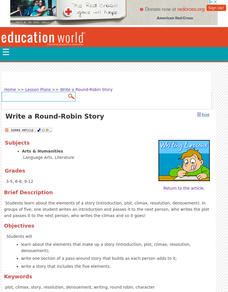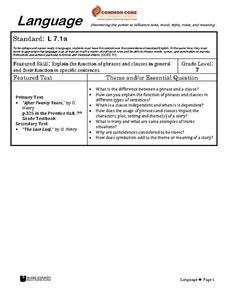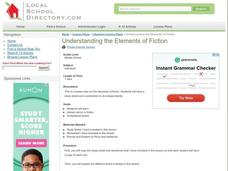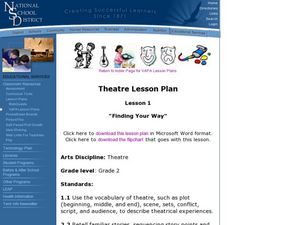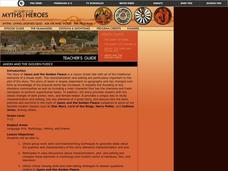Novelinks
Nightjohn: Bloom's Taxonomy Questions
After completing Nightjohn, Gary Paulsen's young adult novel about slavery set shortly before the Civil War, readers respond to a series of questions crafted to reflect Bloom's taxonomy.
Curated OER
Cuentos
Students revise Spanish mystery stories. They sequence the events from a group's mystery story and suggest revisions for the setting. They revise their stories using the suggestions from classmates and describe characters in folktales....
Curated OER
Create Learning Experiences with The Polar Express
Center content-integrated lessons around the timeless holiday book, The Polar Express.
Curated OER
Knights of the Round Table adapted by Gwen Ross
Everyone loves the tales involving King Arthur and his knights. After reading Knights of the Round Table by Gwen Gross, learners draw inferences and conclusions, analyze story elements, and discuss figurative language, including...
Curated OER
Write a Round-Robin Story
Students discover the elements of a story (introduction, plot, climax, resolution, denouement). In groups of five, one student writes an introduction and passes it to the next person, who writes the plot and passes it to the next person,...
Curated OER
Making A Story Map
Sixth graders learn to plan a story by using a story map. They analyze a detailed sample story map and answer 5 questions about it. Then, plan their own story using a story map template.
Curated OER
Special Sunflowers
Learners view a picture of Van Gogh's Sunflowers. In this caring and kindness lesson students read Camille and the Sunflower and explore the feelings of the characters. Learners complete worksheets related to Camille's feelings in the book.
Wake County Public Schools
Language
Have your class doing everything from reading literature, analyzing literary devices, identifying independent and dependent clauses, discussing, and writing creatively with the rich resource found here. After a mini lesson on independent...
Curated OER
Short Story Framework
The class gets creative after listening to a short story containing a definitive structure. They are required to think about character, relationship, and setting, while attempting to show rather than tell, in their writing. Dialogue,...
Curated OER
Giving an Oral Book Report
Students give an oral book report. In this language lesson, students choose their favorite book and take notes to help with their book report. They complete a written and oral report focusing on the setting, main character, supporting...
Curated OER
Immigration: Marijana's Story
Second graders explore world geography by researching U.S. history. In this immigration lesson, 2nd graders read the book Marijana's Story and discuss the main character, her goals, and the plot. Students complete a worksheet about U.S....
Curated OER
Understanding the Elements of Fiction
Inform your class on the elements of fiction: themes, settings, characters, plots, dialogue, narration, flashback, clues, climax, resolution. They write the definitions of the terms on the worksheet provided.l Tip: Have them write a...
Curated OER
Reader's Theater with a Twist
Second graders create a Reader's Theater script. For this reader's theater lesson, 2nd graders create their own script of a story in groups. They make props and act them out on FlipVideo and voice thread.
Curated OER
Theatre Lesson Plan: Finding Your Way
Second graders identify story elements in familiar stories from their lives. In this story elements lesson, 2nd graders act out familiar activities by following directions. Students read a story and discuss the story elements....
Teachit
Keeping a Reader's Journal
A reader's journal can help pupils comprehend, connect to, and remember a text. Have them follow the prompts here to write journal entries for any literary text.
Curated OER
Read it and Remember it!
Young scholars are divided into small groups, read a section from an assigned book, and draw a picture of what they read. They list the main characters, theme, setting, and plot of the book. They share their information/drawings with...
Curated OER
And the Moral of the Story is...
Students retell a story using computer software. In this story elements lesson, students retell the story giving the plot, setting, characters and moral using Pixie software.
Curated OER
Character Scrapbook Teacher's Guide
Learners analyze a book's characters and create a scrapbook to print and save. In this on line interactive characterization lesson plan, students identify character traits and gain a deeper understanding of a book's characters.
Curated OER
Jason and the Golden Fleece
Students read and analyze the classic Greek tale of "Jason and the Golden Fleece." They compare/contrast the story with modern works of literature and films, answer discussion questions, and retell the story in a modern-day setting.
Curated OER
Once Upon a Time
Students use Inspiration to Identify the defining characteristics of Fairy Tales, They create a literary web, study the basic structure of plot, and recognize that themes reoccur across literary works. They complete Once Upon a Time...
Curated OER
Same Old Story
Students relate their favorite childhood stories to their lives today. Through personal interviews, students discover the connections between their favorite stories and their own choices and characters, as well as connections to the...
Curated OER
Literary Analysis - Young Goodman Brown
Why is literary analysis so important? Readers explore writing a literary analysis by reviewing literary elements such as character, metaphor, plot, setting, simile, personification, and style. They read "Young Goodman Brown" by...
Vanier College
Analyzing Short Stories/Novels
Good questions can help focus readers' attention on the elements writers use to add depth to their stories. The questions on this worksheet do just that and encourage readers to think critically about a story and author's purpose.
Curated OER
Practice Book O
Whether you need resources for reading comprehension, literary analysis, phonics, vocabulary, or text features, an extensive packet of worksheets is sure to fit your needs. Based on a fifth-grade curriculum but applicable to any level of...






